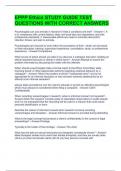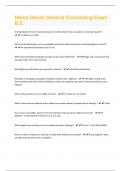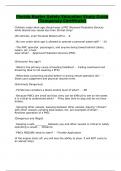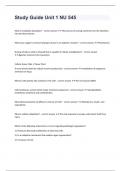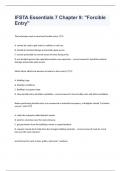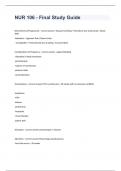Week 1
L2. Price discrimination
Cabral’s Price Discrimination Chapter 10
● Airline pricing is one of many examples in which firms set different prices
of the (approximately) same good. Other examples include toothpaste,
electricity, and computer software.
Price discrimination = the practice of setting different prices for the
same good, whereby the relevant price in each case depends on the
quantity purchased, on the buyer’s characteristics, or on various sale
clauses
● In most chapters → assumption: firms set one price only for each price. In
this chapter, the firm is a monopolist/oligopolist is able to discriminate.
Resale and Price Discrimination
● In a perfect competitive market the law of one price must prevail if
there are no different prices for the same product. In the real world this is
common while little or no arbitrage occurs.
Arbitrage= refers to the practice of buying and selling to profit from a
price difference; an arbitrageur is an agent that engages in such practice.
● For one price to prevail, conditions are either (1) agents are imperfectly
informed about the different prices (ch. 12), (2) or more commonly the
transaction costs of buying and selling are so high = resale is not
profitable such as reselling a 3 for 2 toothpaste.
● In some cases, resale is illegal such as reselling electricity bought from
public utility (more about legal aspects at 10.5).
● SUMMARY: Price discrimination requires the absence of resale.
Cost Differences and Price Discrimination
● BMW is more expensive in the US than in Germany because of costs and
import tariffs but this reason is not enough for price discrimination.
● An alternative test for price discrimination: the ratio of prices across
markets is different from the ratio of marginal costs. Example: Hardcover
vs. Paperback - they are sufficiently similar that the ratio test should be
considered a sufficient indicator of price discrimination.
1
, 10. 1 | TYPES OF PRICE DISCRIMINATION
● Most important classification is the info on buyers; customer’s willingness
to pay. If buyer characteristics are observable → sellers can establish
different prices as a function of the buyer’s characteristics. Examples:
country-specific prices, membership discounts, special “academic” prices
for software, student discounts on mags subs, and reduced train fares for
the elderly. This type can be referred to as selection by indicators or
third-degree price discrimination.
● Other instances: the seller has some info about the heterogeneity of the
buyers’ preferences but cannot observe the characteristics of each buyer
in particular. However, it is possible to discriminate between different
buyers by offering a menu of selling contracts that include clauses + price.
Example: Pex or Apex fares; Pex fares allow the seller to discriminate
indirectly between business and leisure travelers - this type is second-
degree price discrimination.
● SUMMARY: Sellers can price-discriminate either based on observable
buyer characteristics or by inducing buyers to self-select among different
product offerings.
A Note on Semantics
● The definition of second- and third-degree discrimination is not universally
agreed upon. The difference depends on whether the seller can
distinguish buyers directly or indirect, whether there is selection by
indicators (third-degree) or self-selection (second-degree) - consumers
self-select between offerings.
● An alternative definition of second-degree price discrimination= unit price
depends on quantity purchased (not identity consumer). Example: phone
bill is monthly rental (fixed fee) and call charges (variable fee); because
of fixed fee, unit price is decreasing with the number of calls aka
nonlinear pricing. Both definitions agree price is not dependent on the
identity of the consumer but the quantity consumed and
nonlinear=second-degree.
First-Degree Price Discrimination
● Is a situation in which the seller sets different prices for each buyer and
for each unit purchased by each buyer thus extracting all the consumer’s
surplus. Classical example: Small-town doc with good knowledge about all
the town's inhabitants including their financial status and set fee
accordingly.
● Also known as perfect discrimination. This happens infrequently but
useful for welfare analysis (see 10.5).
2
L2. Price discrimination
Cabral’s Price Discrimination Chapter 10
● Airline pricing is one of many examples in which firms set different prices
of the (approximately) same good. Other examples include toothpaste,
electricity, and computer software.
Price discrimination = the practice of setting different prices for the
same good, whereby the relevant price in each case depends on the
quantity purchased, on the buyer’s characteristics, or on various sale
clauses
● In most chapters → assumption: firms set one price only for each price. In
this chapter, the firm is a monopolist/oligopolist is able to discriminate.
Resale and Price Discrimination
● In a perfect competitive market the law of one price must prevail if
there are no different prices for the same product. In the real world this is
common while little or no arbitrage occurs.
Arbitrage= refers to the practice of buying and selling to profit from a
price difference; an arbitrageur is an agent that engages in such practice.
● For one price to prevail, conditions are either (1) agents are imperfectly
informed about the different prices (ch. 12), (2) or more commonly the
transaction costs of buying and selling are so high = resale is not
profitable such as reselling a 3 for 2 toothpaste.
● In some cases, resale is illegal such as reselling electricity bought from
public utility (more about legal aspects at 10.5).
● SUMMARY: Price discrimination requires the absence of resale.
Cost Differences and Price Discrimination
● BMW is more expensive in the US than in Germany because of costs and
import tariffs but this reason is not enough for price discrimination.
● An alternative test for price discrimination: the ratio of prices across
markets is different from the ratio of marginal costs. Example: Hardcover
vs. Paperback - they are sufficiently similar that the ratio test should be
considered a sufficient indicator of price discrimination.
1
, 10. 1 | TYPES OF PRICE DISCRIMINATION
● Most important classification is the info on buyers; customer’s willingness
to pay. If buyer characteristics are observable → sellers can establish
different prices as a function of the buyer’s characteristics. Examples:
country-specific prices, membership discounts, special “academic” prices
for software, student discounts on mags subs, and reduced train fares for
the elderly. This type can be referred to as selection by indicators or
third-degree price discrimination.
● Other instances: the seller has some info about the heterogeneity of the
buyers’ preferences but cannot observe the characteristics of each buyer
in particular. However, it is possible to discriminate between different
buyers by offering a menu of selling contracts that include clauses + price.
Example: Pex or Apex fares; Pex fares allow the seller to discriminate
indirectly between business and leisure travelers - this type is second-
degree price discrimination.
● SUMMARY: Sellers can price-discriminate either based on observable
buyer characteristics or by inducing buyers to self-select among different
product offerings.
A Note on Semantics
● The definition of second- and third-degree discrimination is not universally
agreed upon. The difference depends on whether the seller can
distinguish buyers directly or indirect, whether there is selection by
indicators (third-degree) or self-selection (second-degree) - consumers
self-select between offerings.
● An alternative definition of second-degree price discrimination= unit price
depends on quantity purchased (not identity consumer). Example: phone
bill is monthly rental (fixed fee) and call charges (variable fee); because
of fixed fee, unit price is decreasing with the number of calls aka
nonlinear pricing. Both definitions agree price is not dependent on the
identity of the consumer but the quantity consumed and
nonlinear=second-degree.
First-Degree Price Discrimination
● Is a situation in which the seller sets different prices for each buyer and
for each unit purchased by each buyer thus extracting all the consumer’s
surplus. Classical example: Small-town doc with good knowledge about all
the town's inhabitants including their financial status and set fee
accordingly.
● Also known as perfect discrimination. This happens infrequently but
useful for welfare analysis (see 10.5).
2




